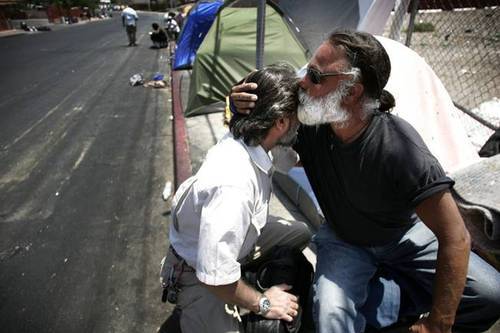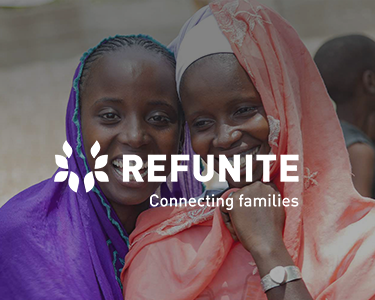Refugees with similar histories are working to change one’s life of homelessness and mental problems while fighting rolls of red tape.

Jamshid Afshar, right, greets Mokhtar Hossein for the first time outside his tent on Foremaster Lane just north of downtown Las Vegas. Afshar has been living in the homeless tent camp since coming to Las Vegas. (Leila Navidi)
One of the two men sits on the couch in his student-sized apartment near UNLV and sees the faces, the bodies of thousands of fellow Iranian political prisoners whom the Khomeini regime shot, hanged and blew up in the summer of 1988. He was one of hundreds who survived.
“It’s like it’s happening right now,” says Mokhtar Hossein on a recent morning, black tea brewing on his stove, walnut-and-honey pastries on a table. “They’re all right here with me.”
The other man dreams at night — in his sleep on a downtown Las Vegas sidewalk, or more recently, on a Catholic Charities bunk bed — of killing Iraqis with an AK-47 assault rifle, of wading through the blood of thousands, until he arrives, he says, like Jesus Christ resurrected, at the end, a survivor. He was one of the few in his battalion who didn’t die in the Iran-Iraq war, which consumed most of the 1980s.
•••
Mokhtar Hossein and Jamshid Afshar are survivors. Both lost their fathers to the Khomeini regime that ruled Iran from 1979 to 1989. A firing squad shot Hossein’s father, an air force colonel. The regime put Afshar’s father, an army sergeant, in jail for two years. When he was released, he was a psychologically battered alcoholic.
Both also fought as teenagers in the Iran-Iraq war.
And now they are refugees, a legal status the United Nations confers on the victims of unimaginable violence abroad, giving them the right to start new lives in the United States or other countries.
Hossein suffered five years of jail and torture beginning in the late 1980s, leaving the left side of his body paralyzed. He has endured 100 operations and procedures and was confined to a wheelchair for seven years. But he has defied doctors, recovering the ability to walk here in Las Vegas, through Zen meditation.
He survives through help from the United Nations Assistance Program, which supports political refugees who are torture survivors.
Afshar arrived in the U.S. in 1988 and seemed to be patching together a new life with a new wife in a suburb of Dallas.
But his mind unraveled.
There were fights, breakups, arrests for disorderly conduct, a life on the road. After a series of left turns that included days in California jails and psychiatric clinics, Afshar wound up in a camp of homeless men and women on Foremaster Lane, ground zero for the Las Vegas Valley’s homeless population.
Eleven months ago, Hossein met Afshar in that camp after someone told him there was an Iranian refugee living on the streets.
“I felt sad and angry that one of my people would face this situation in the United States,” says Hossein, describing meeting Afshar in May on the hot pavement of Foremaster Lane, lined with dozens of tents and homeless men and women.
Afshar bowed, kissed Hossein’s hands, thanked God and said he knew the day would come when someone would deliver him from suffering.
“It was a big shame,” Hossein says. “It didn’t make sense. I decided to help him.”
Hossein gave Afshar a little pocket money and took him a tent and a cooler. Weeks later, Metro Police came through the homeless camp and threw the tent and cooler away.
Hossein got him another tent and cooler, but someone stole them from Foremaster Lane.
Hossein was no stranger to activism. He spent more than seven years in jail because he had opposed the Khomeini regime. Since arriving in Las Vegas under the care of Catholic Charities in early 2000, he had flooded agencies with calls and e-mails, many of them related to his medical needs.
He found out that Afshar had been to Catholic Charities nearly two years before Hossein met him. Afshar had gone to the agency seeking “the same thing he needs now,” Hossein says. “Papers, a job, an apartment.”
But Afshar got violent. He banged a table and threatened staff members. His case was closed.
Hossein started over with Jasmine Coca, in charge of immigration services at Catholic Charities. She was the same one who couldn’t help Afshar two years before, afraid, she says, for the safety of her staff. But Hossein was able to pacify Afshar, to lend some order to the process of rebuilding his identity.
The only thing Hossein had for starters was paperwork from an inpatient psychiatric treatment clinic Afshar stuffed in a jeans pocket. The clinic had kicked Afshar out. But the papers had his name, his Social Security number.
Coca contacted federal immigration authorities, the ones who could confirm Afshar’s legal right to live and work in the United States.
It took nine months, but the proof arrived in late February. Hossein is now a careful steward of the 4-by-6-inch piece of paper, a photo in the corner of Afshar with his trimmed gray beard, the number “I-94” indicating that the homeless man has the right to be in this country.
But when Hossein took Afshar to the DMV, seeking the sort of ID needed to find an apartment, a job and mental health services, the two ran into another bureaucratic obstacle. The DMV wanted another piece of paper from federal immigration authorities, the so-called green card. So they made another appointment to see an official at the U.S. Citizenship and Immigration Services offices on Pepper Lane.
Coca says it is unusual for such a case to take longer than a year to resolve. Hossein says it should be easier to get a man some paperwork needed for a roof over his head, an appointment with public agencies.
Meanwhile, as the months piled on, the two refugees developed a halting relationship.
Hossein took Afshar to places he’d never been — Red Rock, Henderson, Summerlin, a local barber, a mosque in east Las Vegas.
Afshar left the mosque in a panic, anxious that authorities would arrive at any minute seeking terrorists.
For their outings, “if there are other people in the car, I learned to ask him to be silent,” Hossein says. “This is because, if I let him talk, he begins to get all excited, and he describes a battle, or someone he is going to kill, and I’m afraid I’ll lose control of the car, and we’ll have an accident. If we’re alone, then we can both talk.
“We have things in common. We were both in the front lines of the Iran-Iraq war,” Hossein adds.
This prompts Afshar to talk about dead bodies, scenes in the desert, losing friends, valiant soldiers, the blood.
Hossein sees this as necessary, a vital part of what he is trying to achieve with Afshar. “I have to talk about his past,” he says. “If I don’t return him to his past, I can never take him to his normal life in the present.”
He says he does this not by probing, or asking many questions, but by telling his stories, what he calls “flashbacks,” “to give him some sort of connection.”
“You’re not supposed to think about yesterday,” Afshar says. “I get bad dreams. I’ve seen the pasts of people like Mokhtar. I have no past. It’s all war.”
In August, Hossein took Afshar to apply for a job at a pizzeria owned by an Iranian. Within an hour, Afshar, a large knife in his hand, standing in the kitchen, shouted out, “I’m an Iranian commando! I’m working for the CIA! I’m going to kill you all!”
Hossein, who has martial arts training, grabbed his wrist, making him drop the knife.
“This is not a war,” he told Afshar. “You are here, in a pizzeria.”
•••
Moniro Ravanipour, an Iranian novelist and writer-in-residence at UNLV’s City of Asylum program, says “all Iranians … carry trauma with them, even if they go somewhere else.”
Outsiders don’t understand. It’s not just the wars. The country’s list of tragedies over the past three decades is a long one. Most Iranians lost someone or were in some other way affected by the 1988 prison massacres, to cite just one example.
The result: The past is always present. Ravanipour saw this in her own life when she accompanied a friend to a courtroom and found herself suffering cold sweats and an attack of nerves, brought back in time by her surroundings to an Iranian courtroom that was anything but just.
“It’s very hard to remove this kind of psychological disorder,” she says.
Speaking of the Iranian diaspora, an estimated 4,000 of whom live in Nevada, she says, “We go from one location to the next location. But the main location is in our mind.”
Coca says it is unusual to find Middle Easterners among her homeless clients seeking to re-establish their identities. “Usually they have support from family or friends,” she says.
But Afshar has only Hossein. He hasn’t talked to his father, he says, in 11 years. He remembers clearly the day his father sat the family down at a table in their Tehran home, fresh from prison. “My dad told me everything. He cried. He was drinking a beer, which you weren’t supposed to have at the time. He was never the same.”
Afshar blames his father for convincing him to come to the United States. “Why did he bring me here?” he wonders. “People are sleeping in the streets!”
A photo of Hossein’s father occupies the center of the wall over his living room couch. It says, “Ali Mokhtar Zebai, Iranian fallen hero.”
A week before Khomeini’s soldiers shot him, Zebai told Hossein to never give up, or he would never be forgiven. He was talking about Hossein’s shared opposition to the Khomeini regime. But Hossein took his father’s words as a lesson for life. “His mentality gave me strength,” he says.
So Hossein survived two years of solitary confinement in a 4-by-6-foot cell, electric shocks, near death, pain every day for decades, partial loss of hearing, years in refugee camps, the near loss of his legs, the red tape in a new country, the memories.
“Why Jamshid?” he says out loud, questioning the latest episode in his life. “This was another test from God, to see how I pass it. To see how I am doing my job. To finish this life successfully, and enter the next life successfully.”
Source: Las Vegas Sun
This story first appeared in Las Vegas Weekly, a sister publication of the Sun.
By Timothy Pratt


